Donald Trump turns notoriety into a win
- Published
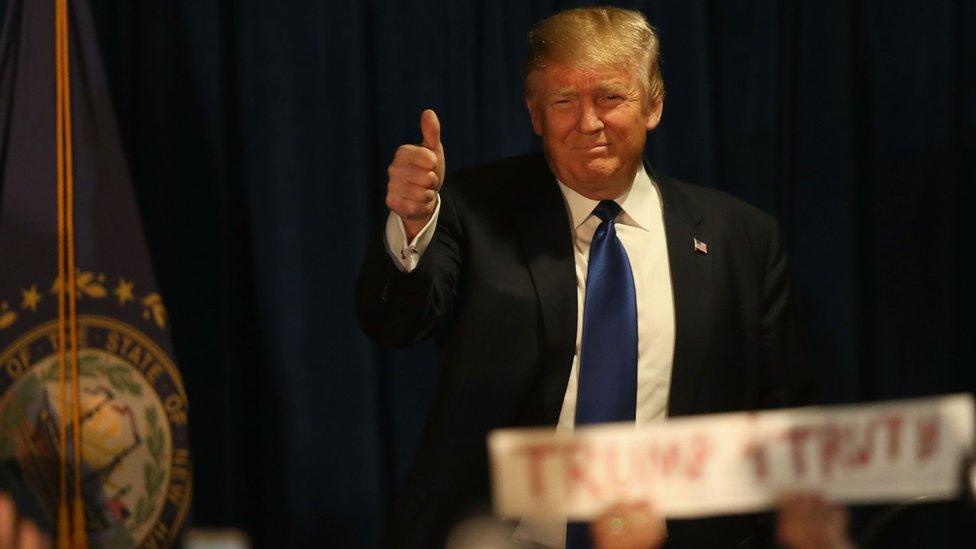
So Donald J Trump has sealed the deal.
The billionaire has shown in New Hampshire that he can turn publicity, controversy, even notoriety, into a winning margin of votes - indeed, a large winning margin.
The Donald is not just hype. The Trump brand clearly works in the political arena.
He is not just the ultimate clickbait candidate, a human headline who has blurred the lines between politics and entertainment, but a serious contender with a path to the Republican presidential nomination.
How can he possibly win, the question asked last June when he first stepped from the golden doors of the elevators in Trump Tower to announce his long-shot bid for the presidency, has now changed. How can he possibly be stopped?
As Donald Trump made the journey down from his executive suite that day he apparently harboured self-doubts, sharing with his wife, Melania, the fear that he might fall flat on his face.
But ever the showman, there was no trace of that uncharacteristic lack of confidence when moments later he announced his bid. Rather, he projected supreme self-certainty, the personal magnetism, the winning aura that's so alluring to many of his followers.
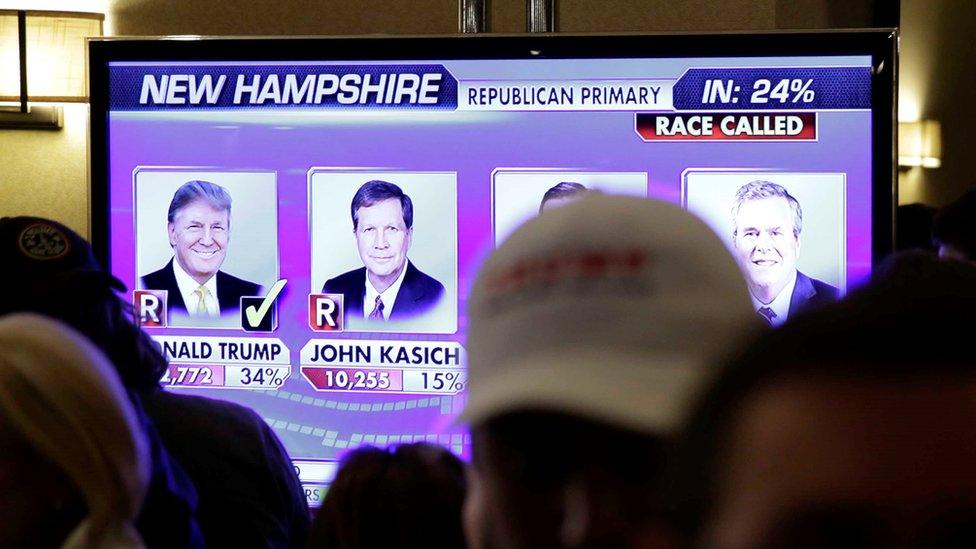
That day also demonstrated his skills at setting the agenda, and framing the contest.
His attack on unauthorised Mexican immigrants, whom he decried as criminals and "rapists," had an electrifying effect on his candidacy. Far from disqualifying him from the presidential nomination, they propelled him towards it.
They also taught him an early lesson - and an ugly lesson, his critics would say. A hard-line stance on immigration, especially when coupled with fears about national security, is a big vote winner.
Months later, when a poll suggested he had fallen behind his right-wing rival Ted Cruz in Iowa, Trump announced his plan to temporarily ban Muslims from entering America. Again, his poll numbers soared.
Noticeable from the exit polls last night was that two-thirds of Republicans in New Hampshire supported his temporary ban on Muslims.
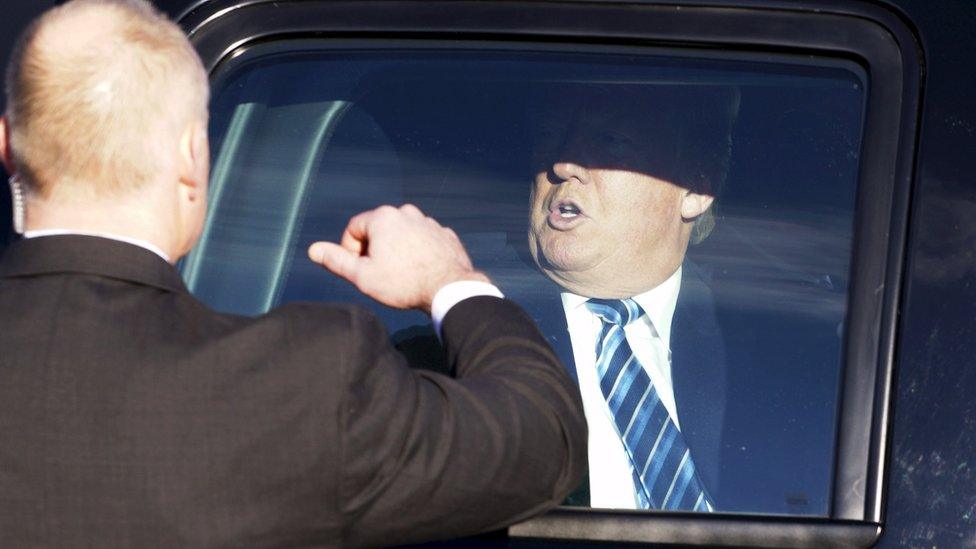
Having Secret Service doesn't hurt Trump's presidential aspirations
The criticism that he is a racist demagogue, and the acid shower of international criticism especially from Muslims and Hispanics, has done nothing to harm him. Quite the contrary.
Early on in his candidacy, Trump also learnt he could defy the usual norms of political engagement. Pundits initially viewed his attack on John McCain, the former prisoner of war and presidential candidate, as suicidal.
Picking a fight with Megyn Kelly, Fox News's most luminous star, also seemed like an act of self-harm. But those insults generated controversy and controversy generated high polls numbers. It's been the calculus of his campaign.
Monopolising the media coverage had an added bonus - it starved rivals of the spotlight, and meant they were constantly having to react to him rather than setting the terms of the debate themselves.
His outspoken attacks also reinforced another of his great selling points, his delight in railing against "political correctness".
These Trump tirades especially resonate with his core support, lower income white males, who earn less than $50,000 a year. The billionaire has enormous blue-collar appeal.
For all his boasts and for all his inflated claims, there's an authenticity about Trump which his supporters also find appealing.
Donald Trump predicts general election success
The Donald is The Donald, just as, incidentally, The Bern is The Bern. At a time when voters globally are rejecting career politicians, Trump is the classic anti-politician. Though at opposite ends of the political spectrum, Trump and Sanders are tapping into the same disenchantment with the elite political class.
Paradoxically then, it turns out he's a highly skilled political operator.
Transferring his skills as a reality television star to the campaign trail, he's good a revving up a crowd, working a rope-line and glad-handing voters. He's a natural when it comes to the stagecraft of campaigning.
Having the Secret Service in tow offering personal protection also gives him something of a presidential aura, and an elongated motorcade to boot. It all helps him project power and success.
His message "Make America Great Again!" is also infectious. As I wrote early in the campaign, he's benefited greatly from tapping into widespread feelings of fear and frustration among voters, but there's also a can-do optimism about his candidacy.
His supporters believe he is a guy who makes things happen and gets things done.
For Trump, New Hampshire was a double victory.
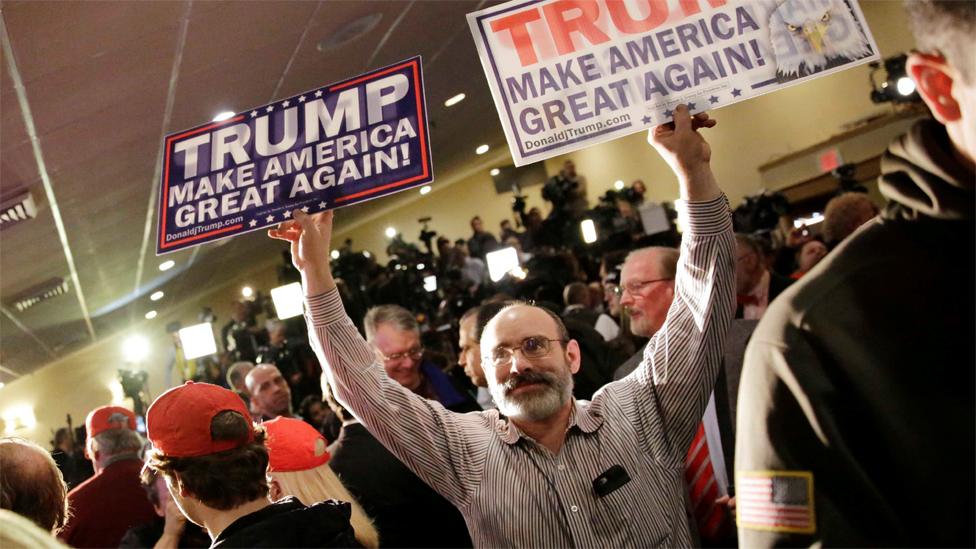
Trump has made one slogan central to his campaign
First, he won by a big margin. Second, no rival from the establishment stable of candidates has emerged from New Hampshire as a clear challenger.
If the first-in-the-nation primary had gone to script for party elders, Marco Rubio would have built on his strong third place showing in Iowa, where he trailed Trump by just 1% to come third, and come a strong second, or possibly even won. But "Marcomentum" came to a shuddering halt in the televised debate on Saturday, when, at the hands of Governor Chris Christie, he received a mauling.
The young Floridian ended that night with blood in his spitbucket, and a reputation as a political bantamweight.
Governor John Kasich of Ohio, who did well in New Hampshire by adopting a similar playbook to John McCain in 2000, is simply too moderate to prosper in the modern-day GOP.
It is hard to see him remain viable as the contest moves south, especially in South Carolina which was designed by conservative Republicans to act as a firewall to block moderate candidates like the cheery Ohioan.
South Carolina will surely do to Kasich what it did to McCain in 2000, which is to stop him in his tracks.
Clues to Trump's success are to be found in his autobiography, The Art of Deal. "I play to people's fantasies," he wrote, back in the late-80s.
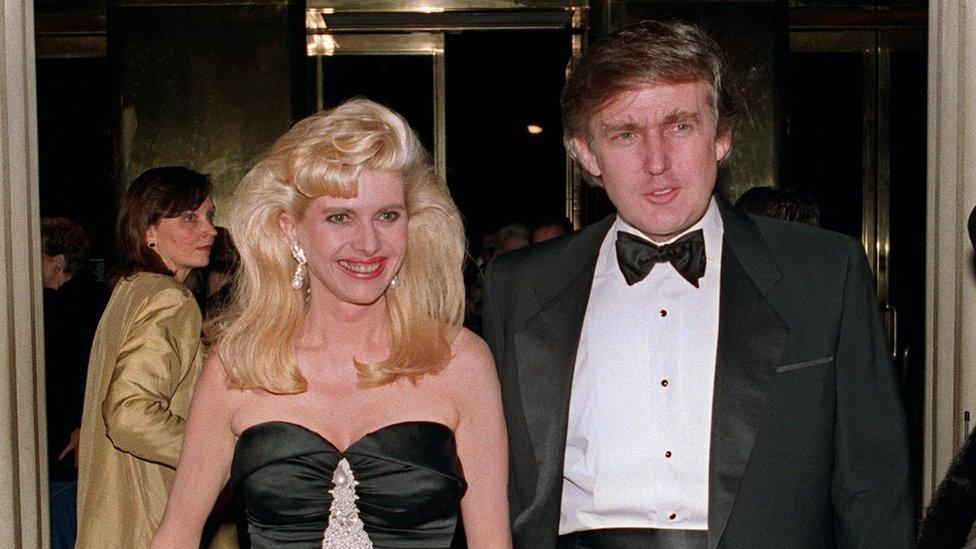
Trump is using many of the same tactics he described in his business dealings
"I call it truthful hyperbole. It's an innocent form of exaggeration - and a very effective form of promotion."
Well currently his "truthful hyperbole" is propelling him towards the Republican presidential nomination.
What many wrote off as fantasy politics is becoming real.